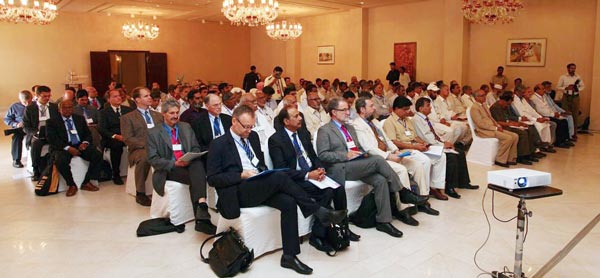On 27-28 May, representatives from CIMMYT, USAID, the Pakistan Agricultural Research Council (PARC), ILRI, IRRI, AVRDC, and UC Davis met with colleagues from several Pakistan universities, agricultural secretaries of the provinces, development sector organizations, private sector representatives, and farmer organizations, to discuss and plan the next stage of the USAID-supported Agricultural Innovation Program for Pakistan (AIP).
In his opening address, Randy Chester, USAID’s Deputy Office Chief for Agriculture, stated that “AIP represents a unique and unprecedented collaboration, in that it will bring together the expertise and resources of all of these organizations, including USAID, to increase the income of farmers across Pakistan.” By using the Global Conference on Agricultural Research for Development (GCARD) approach of agricultural research for development (AR4D), AIP “will foster a demand-driven, results-oriented, science research community, and enhance linkages between Pakistan’s agricultural research and innovation communities, the wider global community of agricultural scientists, and the private and civil society sectors,” he concluded.
AIP is a unique program for CIMMYT, aiming to address not only cereals and cereal systems, but also livestock, vegetables, and fruit trees, through a combination of commissioned projects, a competitive grants system, and human resource development. The program will draw on the expertise and resources of the five international partners, but many other Pakistan partners will be brought on as the program develops. PARC Chairman, Iftikhar Ahmad, highlighted the role that Pakistan organizations have to play: “We need a new kind of collaboration,” he said. “It must be a two-way process in that Pakistan must also contribute to international science. Pakistani scientists must play a crucial role in paying back what we get from the outside. Other economies can benefit from Pakistani science as well,” he added.
It would not be the first time that Pakistan has positively impacted worldwide agricultural development. Its national agricultural research system was instrumental in identifying two high-yielding wheat mega-varieties, ‘Mexi-Pak’ and ‘Pak81’, also known as ‘Siete Cerros’ and ‘Seri’, respectively, recalled Hans Braun, Director of CIMMYT’s Global Wheat Program.
During spirited working groups, participants put forward their suggestions for project priorities that will enable AIP to increase the incomes of tens of thousands of farmers, through increased agricultural productivity, in the shortest time frame possible. There will be a strong focus on adapting and up-scaling existing technologies present elsewhere in the region, such as Greenseeker sensors for improved nutrient management.
Closing the meetings, Jonathon Conly, USAID Mission Director, Pakistan, praised the group in their collaboration to revolutionize Pakistan’s agricultural sector. “If we care about driving economic growth, it has to be done by increasing farm productivity, by increasing adoption of technologies, and human capacity,” he said; concluding: “I believe that AIP will lead to the desperately-needed increases in agricultural productivity in this country.”
 Nutrition, health and food security
Nutrition, health and food security 
